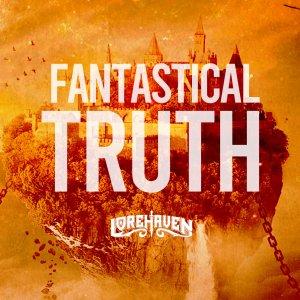Fantastical Truth

179. How Can Great Stories Show ‘Real’ Men vs. Good Men?
“Hey there, pilgrim. Welcome to the world of the Real Man.[1. Photo by Saman Rashidi on Unsplash.] We’re hard-livin’, hard-drinkin’, gray-area kinds of scallywags. We ride fast horses an’ drive faster cars. We got eleventeen girlfriends and one on the side. Sometimes we even shoot folk with guns and abandon our families and never cry or get diseases and we don’t ask folks nicely for nothin’. Ya wanna know why? It’s cuz we’s Real Men.” And now, inspired by Nancy R. Pearcey’s new book The Toxic War on Masculinity, we shall compare this notion of the “Real Man” with the good men in fantastical stories, and especially the best Hero of all.
Subscribe to Lorehavenmiddle grade • teens + YA • adults • onscreen • author resources • gifts • guild
Episode sponsors Enclave Publishing: The Eternity Gate by Katherine Briggs The Pop Culture Parent by Ted Turnau, E. Stephen Burnett, and Dr. Jared Moore The Lorehaven Guild Concession stand- I am but one man, and can’t speak to all issues involving sex differences.
- But lately I’ve been noticing “Real” Men vs. Good Men in fantastical tales.
- Like my solo shows, this one feels more personal, with favorite examples.
- For all the disclaimers about “toxic masculinity,” Pearcey handles those.
- She’s not here today, but I daresay her book speaks to most questions!
- In The Toxic War…, Pearcey traces how society has portrayed men.
- American culture shifted from pioneers/Puritans to industrial workers.
- This often separated men in “the world” from their families at home.
- People began to think that women were spiritual and men were crass.
- Then we got overcorrections: men ought to be “wild” or “barbarian.”
- Pearcey points to the first Western ever written: The Virginian (1902).
- It “laid out the pattern that would be followed by all other Westerns.”
- Loners, gunmen, cowboys, outlaws, and/or lawmen become the heroes.
- Settlers, farmers, husbands, fathers, leaders become side characters.
- Most Westerns aren’t fantastical, but they heavily influenced later tales.
- Just when I thought of Burroughs’s Tarzan of the Apes, she goes there.
- Now we hear men ought not “evolve” but are just “wild beasts at heart.”
- Some of these images persist in geek culture. e.g. Wolverine, Deadpool.
- Captain Kirk is an interesting case, caught half between “Real” and Good.
- Han Solo is an exception (at first): a “Real” Man who must become good.
- Jesus Christ, of course, is the top example of the most perfect Man ever.
- What does this look like? Biblical, virtuous, firm yet compassionate.
- A good man cares for people and defends the good (see ep. 178).
- Many great superheroes exemplify this: Superman, Spider-Man, Batman.
- So do the great Starfleet captains: Kirk, Picard, Sisko, Archer, and Pike.
- Stephen stans Captain Christopher Pike from Star Trek: Strange New Worlds.
- Meanwhile, manga/anime hero Himura Kenshin is a repentant samurai.
- He swore off manslaying, but uses a reverse-blade sword to defend life.
- Another recent example is One Piece and its winning live-action version.
- One Piece shows many different varieties of flawed yet good men:
- First, focus not on bad men but on God who created us originally good.
- Focus on Jesus, the perfect and actual real/Good man who saves people.
- Focus on the Holy Spirit, who supernaturally changes bad/”Real” men.
- Secondly, plug into great nonfiction books that apply truth to your life.
- Third, get involved in a local church. Practice at small disciplines.
- You may also find wisdom in common-sense books by non-Christians.
- Fourth, for single men, pursue a calling with advice from friends/family.
- Even if it seems small and boring, everyone needs to start at that place.
- Fifth, watch how you “feed” your imagination! Don’t enjoy junk “food.”
- Get great stories that help “train” your heart to enjoy good-men heroes.
- Six, always guard against “Real” Men stereotypes and idol temptations.
- Seven, pursue man’s chief end: glorify God by enjoying Him forever.
- Look for a new article: How to Help Your Teens Engage Dystopian Tales.
- This Friday we review the fantasy novel Wrought of Silver and Ravens.
- Subscribe free to get updates and join the Guild
I’m writing this as both a Christian and as a fan of things many mainstream churches easily frown upon, including J.K. Rowling. When I tell people what I love to read and do, I don’t give trigger warnings or nuances for why I enjoy them, so I don’t explain how I can enjoy the fiction of someone with clearly opposing political views than my own (otherwise, what I’ve read would be down to perhaps a third, and I’ve read over 800 books so far). If someone writes a good story, I’m reading them.
With that said, anti-Rowling trolls are hilarious in how they rant and rave about how she’s anything but humane, but fail to provide one single tweet where she’s shown actual hatred against any community. They themselves show to have less tolerance than most street preachers I encounter, easily more hypocritical than the churches they rail and cry against. The usual response I get is either a general “It’s all over her Twitter/X feed” or get blocked.
Next on Fantastical TruthWhat if sixteen-year-old Alice fell into that famed rabbit hole and discovered Wonderland is actually a dystopian world—where you need to survive the annual and deadly Wonderland Trials and then confront The Looking-Glass Illusion? Sara Ella, author of these two dark-whimsical fantasy adventures, joins Lorehaven to explore how fictional stories reflect curious realities.






 Visit Podcast Website
Visit Podcast Website RSS Podcast Feed
RSS Podcast Feed Subscribe
Subscribe
 Add to MyCast
Add to MyCast